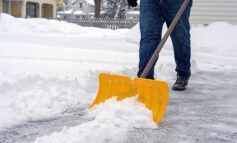
LANSING — With the arrival of winter weather, Michigan residents are encouraged to make emergency preparedness a priority.
Severe winter weather poses health and safety concerns with extremely cold temperatures, freezing pipes, potential propane shortages and power outages. The Michigan State Police Emergency Management and Homeland Security Division offers several steps that families should take to prepare for the winter season.
To prepare your home for winter:
• Weatherproof your home by installing weather-stripping, caulking and insulating walls, doors and windows.
• Insulate any water lines that run along exterior walls so pipes are less likely to freeze.
• Lock in a propane rate now and have a backup heating plan, such as a generator, wood stove or fireplace.
• Have gas or oil furnaces inspected by a qualified professional and change the air filter.
• Have your fireplace and chimney cleaned and inspected. Contact your local fire department for a referral or look for a local inspector online.
• Install battery-operated carbon monoxide (CO) detectors near every sleeping area. CO poisoning is most prevalent when furnaces are turned on to fight cold winter temperatures, but commonly occurs after winter storms and accompanying power outages, when people tend to rely on portable generators for electricity.
• Clean gutters to prevent ice dams from forming. Roof ice dams can cause water to build-up, leading to interior damage.
• Clear storm drains along the curb to enable water to drain. If plugged, water has the potential to go into low-lying areas and flood basements.
• Have an emergency preparedness kit stored safely in your house that includes: water, non-perishable food, first aid kit, extra batteries, a battery or hand-crank powered radio, emergency lighting or flashlights, extra blankets and warm clothing.
To prepare your vehicle for winter:
• Have your radiator system serviced before winter and make sure to replace windshield wipers and wiper fluid with a wintertime mixture that will not freeze.
• Replace any worn tires and check air pressure regularly.
• Have your brakes, brake fluid, oil, car battery, heater and exhaust checked to make everything is running efficiently.
• Keep your gas tank at least half full at all times to avoid fuel lines freezing up and getting ice buildup in your tank.
• Keep an emergency preparedness kit in your vehicle stocked with: batteries, battery powered or hand-crank radio, flashlight, windshield scraper, jumper cables, shovel, blankets, first aid kit, non-perishable food and bottled water in the event you get stranded or stuck.





Leave a Reply